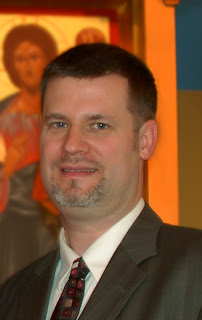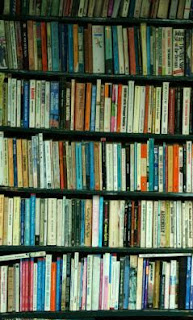Carl Olson has a very unique background. Raised in a Fundamentalist home in Montana, he attended an Evangelical Bible college in Saskatchewan, Canada. After years of wrestling with the claims of Catholicism, Carl and his wife then entered the Catholic Church in 1997. (Their conversion story appears in the book, Surprised By Truth 3.)
After his conversion Carl became a successful Catholic author writing numerous articles and books including Will Catholics Be “Left Behind”? (Ignatius Press, 2003) and The Da Vinci Hoax (Ignatius Press, 2004).
He’s now the new editor of Catholic World Report and Ignatius Insight, an online magazine featuring essays, interviews, reviews and news related to the Catholic Church and the work of Ignatius Press. He also moderates the Insight Scoop, the popular Ignatius Press blog.
Carl also recently authored the Study Guide for Fr. Robert Barron’s acclaimed CATHOLICISM film series and is currently working on three new book projects.
Carl graciously sat down with me to discuss several of our favorite subjects including reading, writings, books, and more.
(This is the first of a two-part interview. Come back on Thursday for the second part.)
Q: You’ve run Ignatius Insight for a while, and with your books and editing roles your days are filled with writing. What are some of the ups and downs of being a full-time writer?
Readers might be surprised to learn that not only did I invent the Internet, I was the first blogger. Ever. And if any readers aren’t surprised to hear that news, I humbly acknowledge their trust and suggest they seek therapy for gullibility susceptibility syndrome.
But, more seriously (if only slightly), this summer will mark ten years as a blogger—or, as I prefer to be called, “author of thousands of mini-books that don’t cost readers a cent.” I began blogging in June 2002, shortly after becoming editor of Envoy magazine, and then began blogging on Insight Scoop in May 2004, after taking the job as editor of Ignatius Insight.
Which brings me to your question. First, I think being able to make a living as a writer is a privilege, and I hope to never take it for granted. Writing is a craft and an art, of course, and so deserves due compensation, but a writer must earn a hearing and a readership.
One of the challenges of being a writer is to develop and build trust with readers, which is a complicated and even mysterious process, but necessarily involves integrity—personally, professionally, and everything in between. And since I obviously write often—almost daily!—about Catholicism, I have a great responsibility to present and articulate Catholic doctrine, theology, practice, and history as accurately as possible. I do so first as a Catholic, but then as someone with a vocation to communicate, as best I can, the truth regarding everything I write about, even in the shortest and least consequential blog posts.
 The old saying (or sentiment?) is that a teacher learns more in teaching than the student does in studying under the teacher. The same is true for a writer: he is graced with learning, if he is willing to learn, both about the subject of his work and the process of writing itself. I’m very big on approaching writing as an art, a vocation, and as the fruit of good thinking. Superficially attractive or facilely clever writing might gain attention, even garner awards, but unless it is rooted in the loam of substantive thought and consideration, it won’t last and it won’t satisfy.
The old saying (or sentiment?) is that a teacher learns more in teaching than the student does in studying under the teacher. The same is true for a writer: he is graced with learning, if he is willing to learn, both about the subject of his work and the process of writing itself. I’m very big on approaching writing as an art, a vocation, and as the fruit of good thinking. Superficially attractive or facilely clever writing might gain attention, even garner awards, but unless it is rooted in the loam of substantive thought and consideration, it won’t last and it won’t satisfy.
Unfortunately, we live in a day and age when it is often lousy writers with all of the technique, knowledge, and ability of a blind elephant sewing doilies with shovels who write the best sellers, makes waves in the blogosphere, and have millions of Twitter followers. (Yes, you know who you are. Shame!)
The biggest struggle I face daily with writing is simply managing time, what with participating in seven MLB fantasy leagues and tracking down every bootleg recording made of a KISS and Zamfir concerts (jokes, both. Jokes! Please believe me.)
Q: Fr. Robert Barron is widely hailed as one of the Church’s great evangelists. His recent CATHOLICISM series is sending shockwaves across the Catholic landscape. Thousands of Catholics are working through the associated study curriculum, for which you authored the Study Guide and Workbook. What was it like working with Fr. Barron, and can you talk about the Study Guide commentary and questions?
I first became familiar with Fr. Barron’s work when I read his exceptional book, The Priority of Christ: Toward a Post-Liberal Catholicism (Brazos, 2007), and then interviewed him about it for Ignatius Insight. I thought it was an outstanding work, and I eventually bought and read his other books. As he and the Word on Fire staff began posting his now widely viewed YouTube videos (and other posts), I would watch them and link to them on the Insight Scoop blog. I was quite enthused to hear about the CATHOLICISM project when news of it first came out, and I anticipated it being a significant and unique endeavor.
Then, out of the blue, I received a call from Fr. Stephen Grunow, the Assistant Director of Word on Fire, who asked me if I was interested in putting together a study guide for the project, fashioned a bit after the study guide produced by Ignatius Press for Pope Benedict XVI’s Jesus of Nazareth books. I, of course, readily agreed. Fr. Grunow and I spoke several times about the general approach and focus, and early on I had a conversation with Fr. Barron along the same lines.
The study guide was squarely based on the scripts from Fr. Barron. In fact, when I started working on the project, only the first video had been completed, and it was still in rough form.
Each script was about 3,000 words in length; I essentially tripled the length by adding material, especially drawn from Holy Scripture, the Catechism of the Catholic Church, papal and conciliar documents, and the works of Doctors, Fathers, Saints, theologians, mystics, and so forth (no Hans Küng, I’m happy to report).
The goal was to seamlessly expand the scripts so that viewers could use the study guide as a way to more deeply consider, explore, and contemplate the themes, ideas, and truths presented in the videos. Fr. Barron was especially insistent that the questions I put together at the end were both accessible and challenging. It was a lot of work; it was also very enjoyable. I cannot say enough about how encouraging and patient Fr. Grunow and Fr. Barron were during the months it took to complete the guide.
One thing I appreciate about the project is that it doesn’t coddle viewers by feeding them pablum, nor does it veer off into esoteric fields or fringe issues. It doesn’t pretend to explain everything; rather, it intends to open the doors and present a perspective that is both fresh and yet very much rooted in the Tradition of the Church. The balance achieved, as I think viewers will agree, is due to Fr. Barron’s unique gifts as a thinker and communicator, his loyalty to Church teaching, his deep knowledge of the Tradition, and his obvious love for Jesus Christ. It was a tremendous honor to be a part of the project.
Q: Like me, you’re a voracious reader. Last time we talked you had 37 bookshelves at home and more stacks scattered throughout. What advice would you give people on how to read more and read better?
I may have misled you, as I actually own a total of 37 books, most of which are Louis L’Amour, Tim LaHaye, and Dan Brown novels, along with some of the “for Dummies” books (on knitting, belly dancing, and cryogenic engineering, among others). Ahem.
Yes, I have close to forty bookcases of books laying around here. And I say “laying around” because a good number of them are in stacks on the floor. Which can be disconcerting for guests when they use the bathroom. (We often get asked, “Why do your kids have no beds?” Uh, because beds take up valuable space that can be better filled by books. Duh.)
Regardless, I wish I knew how to read more and read better. I think that reading a few great, essential books is always preferable to reading a lot of mediocre, or even decent books. Quality over quantity. Reading is a relationship, and if you want a relationship to be healthy and mature, you need to put time and effort into it.
For some readers, this might mean setting up some type of reading program. Or simply making a realistic list and working your way through it. Audio books in the car are a great option, especially if you commute or prefer sitting in your car over sitting in your living room.
For others it may include being in a reading group. About eight years ago, I co-founded a men’s Catholic reading group and it is still going strong, with 12 to 15 guys at each meeting. Not only is it a great way to read a wide range of books—we’ve read books by Ratzinger/Benedict XVI, Chesterton, Danielou, de Lubac, Aquinas, Newman, Augustine, von Balthasar, Belloc, etc.—it provides an opportunity to seriously discuss good books, which is something we all should take part of in way or another.
An essential part of being literate is to be conversant with the ideas, arguments, and themes found in great books—to work at understanding the author’s perspective, to engage with his premises and beliefs, and to think critically about what you read and then to articulate, if need be, those thoughts to others. In that way, the relationship deepens, and with it understanding, knowledge, and even wisdom.
I usually take and make notes while reading a book, especially if it is a work of non-fiction. Sometimes I underline and jot notes in the actual books; sometimes I keep notes in a journal. I like to think I can retain all of the good stuff in my memory banks, but I simply cannot, especially now that I’m in my late twenties.
Unfortunately, I also have some bad habits, or at least habits that I don’t recommend. Ever since I was a young boy, I’ve read several books concurrently, sometimes two or three dozen at a time. I estimate that of the books I have read from, I have completed only a small percentage of them. I can, I suppose, blame some of that on my job: I have to be familiar, at least in general, with a lot of books, which means reading in bits and pieces. The positive is that I don’t feel obligated to finish a book once I start reading it; I know people who do feel guilty if they don’t read a book from cover to cover. I’m far too calloused to entertain such silliness.
Click here for Part 2 of our interview!
For more from Carl Olson, be sure to follow his Ignatius Insight blog and check out his personal website.
And if you liked this discussion, check out my other interviews with people like Fr. Robert Barron, Christopher West, Archbishop Chaput, Marc Barnes, and more. Also, be sure you don’t miss future interviews by subscribing to The Thin Veil via feed reader or email.
How have books shaped your own faith?




